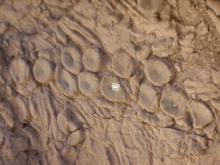A recent report from Boulder, Colorado’s Mount Holyoke University,
published by the Geological Society of America, claims to have found evidence of the existence of the mythical Kraken. According to legends, the Kraken was an enormous squid that would hunt the equally enormous ichthyosauruses, a school-bus-sized sea creature that look a bit like a reptilian needle-nosed dolphin. According to the report, the kraken, whose name has been borrowed from Greek myths, would hunt down the ichthyosaurus, breaking its back and dragging it down to its lair on the ocean’s floor where it would devour it. Then, in a well-fed bout of inspiration, it would arrange the creatures bones in symmetrical designs on the floor of its lair. These designs, according to Mark McMenamin, the paleontologist who claims to have discovered evidence of the kraken’s existence, is what alerted him to the now extinct squid’s lair.McMenamin’s find comes from the Berlin-Ichthyoraur State Park in Nevada, where as many as nine intact 45-foot long ichthyosaur skeletons have been unearthed in the last 50 years. McMenamin points to a well-documented enigma around the site, wherein prominent paleontologists are unable to explain exactly how the remains came to be located here. Also, their remains seem be arranged in concentric patterns, not the natural haphazard arrangement of a typical death. McMenamin began to look for contemporary precedents for this kind of behavior, and modern octopi often will arrange their prey’s remains in patterns. What is there was a very large cephalopod, like the Kraken of Greek myth? "I think that these things were captured by the kraken and taken to the midden and the cephalopod would take them apart.”
The issue with McMenamin’s theories is that the evidence is largely circumstantial, and the hypothesis completely relies on speculation. In other words, there’s no solid scientific evidence to support his claims. Reported in Discover, many paleontologists are skeptical of McMenamin’s work and so-called evidence. Despite that, a number of online and print news outlets, even mainstream news media, have run the story as irrefutable proof (a lamentation toward the degradation of “science news”). Still, Cyriaque Lamar of iO9, has addressed the find thus, “But the possibility of finding that which is essentially a gargantuan mollusk’s macaroni illustration?” he wrote, “That’s the kind of glorious crazy you hope is reality.” It does seem to be primarily hope and the selective acceptance of circumstance that allows so many professionals in the science news field to report on such invalidated findings.
